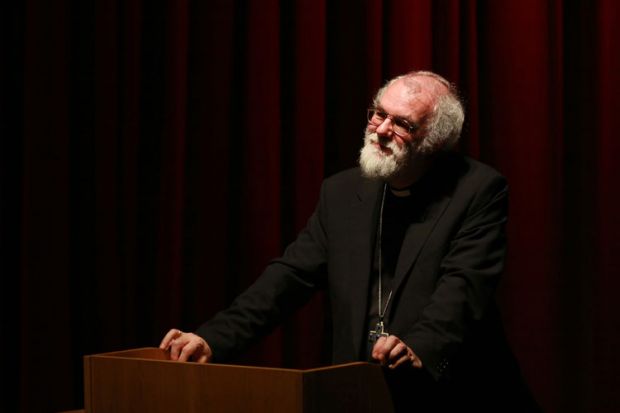Source: Mark William Penny / Shutterstock.com
Describing some universities as “elite” puts off students from poor backgrounds and the word should be abandoned, according to the former Archbishop of Canterbury.
Lord Williams of Oystermouth, who last week was confirmed as the next chancellor of the University of South Wales, also urged institutions not to turn students into mere “cogs in the wheels of employment”.
In an interview with Times Higher Education, he said that the question of access to top universities was a “major problem, there’s no two ways about it”.
He was “rather tired” of some institutions being labelled “elite”, he said, “because it suggests, inevitably, that this is for the select few”.
Asked if it would be better to abandon the word’s use, Lord Williams said, “I wouldn’t mind it if we did”, and he offered the term “world-class” as an alternative.
Russell Group universities are often referred to as “elite” but the group itself does not use the term.
Lord Williams became master of Magdalene College, Cambridge in January after stepping down as head of the Church of England, a position he had held for a decade.
Suggesting that efforts to widen participation in top-ranked universities would be costly, he said: “The difficulty is that we want three things: access, excellence and economy. Really you can have only two at a time, and I’m not sure we’ve cracked that one.”
But he argued that universities were nonetheless “doing quite a lot to get out there” and promote themselves to pupils who might not think of applying. He called for a “much more coordinated understanding” of how a child would be able to reach the standard needed to enter a top university.
Lord Williams also gave a speech at an event in London on 17 June to mark his new role as chancellor. He told guests that universities should create “critical, bold citizens, not just cogs in a wheel of employment”.
“We can sometimes in straitened times slip in to the fallacy of thinking that higher education is really just about ticking the boxes that will get the jobs,” he said.
Yet jobs were dependent on a “healthy and vigorous” society, he said. “They don’t just happen.”
In 2011, Lord Williams provoked government ire with a New Statesman article that argued that the co-alition was pushing through “radical, long-term policies for which no one voted” in education and health.
Asked if university reforms were part of his intended target, he replied that a “whole succession” of governments had contributed to “a steady drift towards a culture of assessment in universities that is not doing very much for intellectual creativity”.
From 1977 to 1991, Lord Williams worked as an academic and in various church positions at the universities of Cambridge and Oxford. Reflecting on how the academy had changed since then, he said: “Thirty years ago, we wouldn’t have foreseen quite what a challenge it would be funding the humanities.”
Register to continue
Why register?
- Registration is free and only takes a moment
- Once registered, you can read 3 articles a month
- Sign up for our newsletter
Subscribe
Or subscribe for unlimited access to:
- Unlimited access to news, views, insights & reviews
- Digital editions
- Digital access to THE’s university and college rankings analysis
Already registered or a current subscriber? Login




